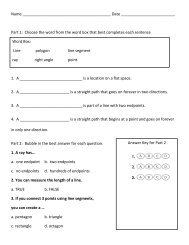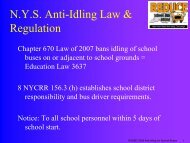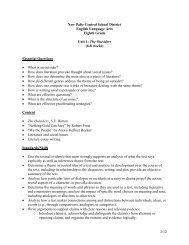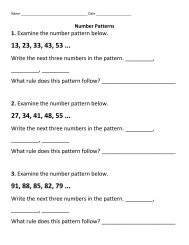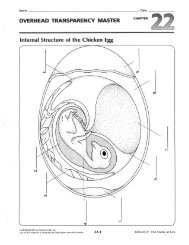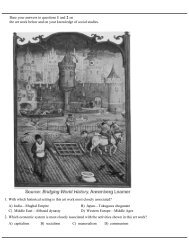8/09 New Paltz Central School District Global History and ...
8/09 New Paltz Central School District Global History and ...
8/09 New Paltz Central School District Global History and ...
- No tags were found...
Create successful ePaper yourself
Turn your PDF publications into a flip-book with our unique Google optimized e-Paper software.
<strong>New</strong> <strong>Paltz</strong> <strong>Central</strong> <strong>School</strong> <strong>District</strong><br />
<strong>Global</strong> <strong>History</strong> <strong>and</strong> Geography 10<br />
Time Essential Questions Skills Assessments<br />
Unit 1: The French Revolution, Latin American<br />
Revolutions, <strong>and</strong> Nationalism<br />
• How were conditions in France conducive to<br />
revolution?<br />
• Why is the French Revolution considered such a<br />
significant event in world history?<br />
September –<br />
October<br />
• Use map skills to draw<br />
conclusions<br />
• Develop <strong>and</strong> use timelines<br />
• Defend a position<br />
• Evaluate a point of view<br />
• Role play<br />
• Compare <strong>and</strong> contrast<br />
• Determine validity of sources<br />
• Analyze primary <strong>and</strong> secondary<br />
sources<br />
• Determine cause <strong>and</strong> effect<br />
relationships<br />
• Student projects-French<br />
Revolution children’s book<br />
• DBE – Causes of the French<br />
Revolution<br />
• Quizzes<br />
• Unit test<br />
October<br />
Unit 2: The Industrial Revolution<br />
• Why did industrialization begin in Great Britain?<br />
• Why do many historians consider the industrial<br />
revolution the most significant even in history?<br />
• Use map skills to draw<br />
conclusions<br />
• Compare <strong>and</strong> contrast<br />
• Determine validity of a source<br />
• Analyze primary <strong>and</strong> secondary<br />
sources<br />
• Evaluate perspective<br />
• DBE- The Industrial Revolution<br />
• Thematic essay – Which<br />
revolution was more<br />
significant, the French or the<br />
Industrial?<br />
• Quizzes<br />
• Unit test<br />
November<br />
Unit 3: The Age of Imperialism<br />
• What is the relationship between<br />
industrialization, nationalism, <strong>and</strong> imperialism?<br />
• What were the positive <strong>and</strong> negative effects of<br />
imperialism worldwide?<br />
• Why are there differing perspectives about<br />
imperialism?<br />
• Use map skills to draw<br />
conclusions<br />
• Compare <strong>and</strong> contrast<br />
• Determine validity of sources<br />
• Analyze primary <strong>and</strong> secondary<br />
sources<br />
• Evaluate perspective<br />
• Thematic essay – What were<br />
the causes <strong>and</strong> effects of<br />
imperialism? (common<br />
assessment)<br />
• DBE<br />
• Student projects<br />
• Quizzes<br />
• Unit test<br />
8/<strong>09</strong>
February –<br />
March<br />
<strong>New</strong> <strong>Paltz</strong> <strong>Central</strong> <strong>School</strong> <strong>District</strong><br />
<strong>Global</strong> <strong>History</strong> <strong>and</strong> Geography 10<br />
Time Essential Questions Skills Assessments<br />
Unit 7: The Cold War/ Post World War II<br />
China <strong>and</strong> Japan<br />
• How has the world been affected by<br />
the Holocaust?<br />
• Why is the Cold War considered a<br />
“war”?<br />
• What was the global impact of the<br />
Cold War?<br />
• What were the effects of the civil war<br />
in China?<br />
• How did Mao Zedung impact China<br />
politically, economically, <strong>and</strong> socially?<br />
• How was Japan altered after its<br />
defeat in World War II?<br />
• Write thematic <strong>and</strong> document based essays<br />
• Analyze documents<br />
• Compare <strong>and</strong> contrast different political<br />
systems (their ideologies, structure, institutions,<br />
processes, <strong>and</strong> political cultures) with that of<br />
the United States, <strong>and</strong> identify representative<br />
political leaders from selected historical <strong>and</strong><br />
contemporary settings<br />
• Analyze how cultural values <strong>and</strong> beliefs are<br />
presented <strong>and</strong> leveraged in different societies<br />
to influence buying decisions<br />
• Recognize perspective <strong>and</strong> bias in primary<br />
sources<br />
• Interpret maps<br />
• Organize items chronologically<br />
• Distinguish between fact <strong>and</strong> opinion<br />
• Interpret timelines<br />
• Interpret political cartoons<br />
• Determine adequacy <strong>and</strong>/or relevancy of<br />
information<br />
• Create <strong>and</strong> publish multimedia (clip art, video,<br />
sound, animation, Web authoring, word<br />
processing <strong>and</strong> layout programs)<br />
• Document Based Essay –<br />
Causes <strong>and</strong> Effects of the<br />
Cold War<br />
• Thematic Essays<br />
o Science <strong>and</strong><br />
Technology –<br />
nuclear<br />
technology, space<br />
technology<br />
o Conflict – Cold<br />
War, Korean War,<br />
Chinese Civil War<br />
o Human Rights –<br />
Armenian<br />
Massacre<br />
o Economic<br />
systems –<br />
capitalism <strong>and</strong><br />
communism<br />
• Unit test<br />
8/<strong>09</strong>
<strong>New</strong> <strong>Paltz</strong> <strong>Central</strong> <strong>School</strong> <strong>District</strong><br />
<strong>Global</strong> <strong>History</strong> <strong>and</strong> Geography 10<br />
Time Essential Questions Skills Assessments<br />
March<br />
Unit 8: The Collapse of Imperialism <strong>and</strong><br />
Nationalism <strong>and</strong> the Struggle For<br />
Democracy<br />
• How have religious differences shaped<br />
political events on the Indian subcontinent<br />
since World War II?<br />
• What factors brought about the<br />
collapse of European imperialism after<br />
World War II?<br />
• What challenges remain in the newly<br />
independent nations?<br />
• Write thematic <strong>and</strong> document based essays<br />
• Analyze documents<br />
• Recognize perspective <strong>and</strong> bias in primary<br />
sources<br />
• Interpret maps<br />
• Organize items chronologically<br />
• Distinguish between fact <strong>and</strong> opinion<br />
• Interpret timelines<br />
• Interpret political cartoons<br />
• Determine adequacy <strong>and</strong>/or relevancy of<br />
information<br />
• Create <strong>and</strong> publish multimedia (clipart, video,<br />
sound, animation, Web authoring, word<br />
processing <strong>and</strong> layout programs)<br />
• Analyze how cultural values <strong>and</strong> beliefs are<br />
presented <strong>and</strong> leveraged in different societies<br />
to influence buying decisions<br />
• Examine the interactions of ethnic, national,<br />
or cultural influences in specific situations or<br />
events<br />
• Compare <strong>and</strong> contrast different political<br />
systems (their ideologies, structure,<br />
institutions, processes, <strong>and</strong> political cultures)<br />
with that of the United States, <strong>and</strong> identify<br />
representative political leaders from selected<br />
historical <strong>and</strong> contemporary settings<br />
• Document Based Essay –<br />
Impact of imperialism on<br />
newly independent nations<br />
• Thematic essays<br />
o Human<br />
Rights/Genocides –<br />
Rw<strong>and</strong>a, Nigeria,<br />
Darfur, Cambodia,<br />
Untouchables in<br />
India (common<br />
assessment)<br />
o Conflict – ethnic<br />
tensions,<br />
Pakistan/India<br />
o Belief systems –<br />
Hinduism <strong>and</strong> Islam<br />
o Economic systems –<br />
cash crop<br />
economies/globaliza<br />
tion<br />
o Science <strong>and</strong><br />
Technology –<br />
nuclear weapons –<br />
Pakistan <strong>and</strong> India<br />
o Geography –<br />
desertification,<br />
deforestation<br />
• Unit test<br />
8/<strong>09</strong>
<strong>New</strong> <strong>Paltz</strong> <strong>Central</strong> <strong>School</strong> <strong>District</strong><br />
<strong>Global</strong> <strong>History</strong> <strong>and</strong> Geography 10<br />
May<br />
Time Essential Questions Skills Assessments<br />
Unit 10: Collapse of the Soviet • Write thematic <strong>and</strong> document based essays • Document Based Essay – Human<br />
Union/Post Collapse of the Soviet • Analyze documents (e.g., The war as<br />
Rights Issues – Eastern Europe <strong>and</strong><br />
Union Eastern <strong>and</strong> <strong>Central</strong><br />
reflected in literature, art, <strong>and</strong> propag<strong>and</strong>a) China<br />
Europe/Post World War II China <strong>and</strong> • Recognize perspective <strong>and</strong> bias in primary • Thematic essays –<br />
Japan<br />
sources<br />
o Conflict – ethnic <strong>and</strong><br />
• What caused the collapse of the • Interpret maps<br />
religious tensions – Eastern<br />
Soviet Union?<br />
• Organize items chronologically<br />
Europe<br />
• Why was the collapse of the • Distinguish between fact <strong>and</strong> opinion<br />
o Nationalism – Tibet <strong>and</strong><br />
Soviet Union a major turning • Interpret timelines<br />
Eastern Europe<br />
point in world history?<br />
• Interpret political cartoons<br />
o Imperialism – impact in<br />
• How have ethnic diversity <strong>and</strong> • Determine adequacy <strong>and</strong>/or relevancy of<br />
former Soviet satellites<br />
nationalism continued to impact information<br />
o Human Rights – Bosnia,<br />
Eastern <strong>and</strong> <strong>Central</strong> Europe since • Demonstrate an underst<strong>and</strong>ing through the<br />
Tibet <strong>and</strong> China, Human<br />
the collapse of the Soviet Union? use of technology about how the<br />
Trafficking<br />
• How successful was Mao Zedong relationship among social, economic, <strong>and</strong><br />
o Economic Systems –<br />
in meeting the needs of the<br />
governmental systems affects change in a<br />
communism under Mao <strong>and</strong><br />
Chinese people?<br />
community over time<br />
Deng<br />
• Why were the Communists • Examine the interactions of ethnic,<br />
o Geography – Hong Kong,<br />
under Deng Xiaoping willing to national, or cultural influences in specific<br />
Japan<br />
adopt elements of the West’s situations or events<br />
• Unit test<br />
market economies but not their • Compare <strong>and</strong> contrast different political<br />
concept of human rights?<br />
systems (their ideologies, structure,<br />
• What hope does democracy have institutions, processes, <strong>and</strong> political<br />
in a post-Deng China?<br />
cultures) with that of the United States,<br />
• How has Japan changed<br />
<strong>and</strong> identify representative political leaders<br />
economically <strong>and</strong> politically since from selected historical <strong>and</strong> contemporary<br />
the end of World War II?<br />
settings<br />
• Create <strong>and</strong> publish multimedia (clip art,<br />
video, sound, animation, Web authoring,<br />
word processing <strong>and</strong> layout programs)<br />
8/<strong>09</strong>
<strong>New</strong> <strong>Paltz</strong> <strong>Central</strong> <strong>School</strong> <strong>District</strong><br />
<strong>Global</strong> <strong>History</strong> <strong>and</strong> Geography 10<br />
June<br />
Time Essential Questions Skills Assessments<br />
Unit 11: <strong>Global</strong>ization/The Twenty • Write thematic <strong>and</strong> document based essays • Documents Based Essay – Human<br />
First Century World<br />
• Analyze documents (e.g., The War as reflected Rights Issues<br />
• How have nations responded to in literature, art, <strong>and</strong> propag<strong>and</strong>a)<br />
• Thematic essays –<br />
issues caused by rising • Recognize perspective <strong>and</strong> bias in primary<br />
o Technology – Impact on<br />
populations <strong>and</strong> poverty?<br />
sources<br />
<strong>Global</strong>ization, Nuclear<br />
• How have advances in<br />
• Interpret maps<br />
Proliferation<br />
technology since World War II • Organize items chronologically<br />
o Conflict – ethnic <strong>and</strong><br />
caused an increase in global • Distinguish between fact <strong>and</strong> opinion<br />
religious tensions – Iraq<br />
interaction <strong>and</strong> altered the • Interpret timelines<br />
o Nationalism – Northern<br />
st<strong>and</strong>ard of living of many? • Interpret political cartoons<br />
Irel<strong>and</strong>, Iraq, Palestine<br />
• Why is globalization viewed as • Determine adequacy <strong>and</strong>/or relevancy of<br />
o Imperialism – cultural<br />
positive by some <strong>and</strong> negative information<br />
imperialism<br />
by others?<br />
• Demonstrate an underst<strong>and</strong>ing through the<br />
o Human Rights – Bosnia,<br />
• Has the Green Revolution been use of technology about how the relationship<br />
Tibet <strong>and</strong> China, Human<br />
effective?<br />
among social, economic, <strong>and</strong> governmental<br />
Trafficking<br />
• Has the United Nations been systems affects change in a community over<br />
o Economic Systems –<br />
successful in maintaining peace time<br />
globalization<br />
throughout the world? Is the • Examine the interactions of ethnic, national, or<br />
o Environment/Geography<br />
Declaration of Human rights a cultural influences in specific situations or<br />
– deforestation,<br />
reality for all?<br />
events<br />
desertification, global<br />
• How have epidemics like AIDS<br />
warming<br />
• Compare <strong>and</strong> contrast different political<br />
affected the world?<br />
systems (their ideologies, structure,<br />
• Unit test<br />
• How have different groups used institutions, processes, <strong>and</strong> political cultures)<br />
terrorism <strong>and</strong> how have nations with that of the United States, <strong>and</strong> identify<br />
responded to terrorist attacks? representative political leaders from selected<br />
historical <strong>and</strong> contemporary settings<br />
• Create <strong>and</strong> publish multimedia (clip art, video,<br />
sound, animation, Web authoring, word<br />
processing <strong>and</strong> layout programs)<br />
8/<strong>09</strong>



